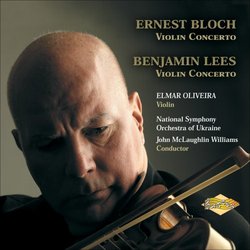| All Artists: Bloch, Lees, Williams, National Symphony Orchestra of Ukraine, Oliveira Title: Bloch/Lees: Violin Concertos Members Wishing: 0 Total Copies: 0 Label: Artek Original Release Date: 1/1/2008 Re-Release Date: 4/29/2008 Genre: Classical Styles: Forms & Genres, Concertos, Instruments, Strings, Symphonies Number of Discs: 1 SwapaCD Credits: 1 UPC: 661853004227 |
Search - Bloch, Lees, Williams :: Bloch/Lees: Violin Concertos
 | Bloch, Lees, Williams Bloch/Lees: Violin Concertos Genre: Classical
|
Larger Image |
CD DetailsSimilar CDs
|
CD ReviewsTwo Great American Violin Concertos in Essential Performance J Scott Morrison | Middlebury VT, USA | 06/17/2008 (5 out of 5 stars) "The violin concertos of Ernest Bloch and Benjamin Lees are among the greatest such concertos ever written by an American composer. Each is a mid-20th-century romantic gem and, more's the pity, each is almost never played. One could argue that Bloch was not an American composer but the fact is he spent more than half of his life in the US, much of it in Cleveland where he was the founding director of the Cleveland Institute and where the concerto was premiered in 1938 with Joseph Szigeti as soloist. It is a big work -- Bloch's only full-blown three-movement concerto -- whose main thematic kernel - A G E (or permutations thereof) - has tinges of both Native American and Jewish coloring in its various harmonizations. This, of course, ties together characteristics of both the composer, who was Jewish, and his adopted country. What's interesting is that at times one hears these influences simultaneously. The first movement is a huge passionately lyrical 20-minute structure that is in an almost-sonata-allegro form; the composer uses multiple melodic fragments which appear in various guises (as well as reappearing in all three movements) and are manipulated in such a way as to create an unfolding landscape through which the solo violin strides like a general commanding his troops, but who occasionally muses about lost opportunities. In the middle movement, Adagio, the violin cantillates over an accompaniment predominantly of woodwinds and soft brass. There is an unmistakably Jewish cast to the movement, one of rueful meditation. The finale, marked 'Deciso', continues for a time the meditative tone but evolves into a dancing affirmation to what has gone before, a kind of triumph over adversity. The concerto is given an inspiriting performance by Elmar Oliveira with the National Symphony Orchestra of Ukraine under conductor John McLaughlin Williams. Oliveira, a player of transcendent abilities and of searching musical intelligence as well as America's only winner of the Gold Medal for violin at the Tchaikovsky International Competition, is one of the few violinists these days who champions this glorious concerto. Thankfully conductor Williams seems to focus his efforts -- on recordings at any rate -- on those woefully neglected American composers one could call Romantics. They make a perfect match for this recording.
Benjamin Lees (b. 1924, and still composing) is one of our most consistently inspired composers. His Violin Concerto is even less well-known than Bloch's but it is equally substantial and musically satisfying. It was written in 1958 and premiered by Henryk Szeryng and the Boston Symphony under Erich Leinsdorf in 1963. A recording, which I have not heard, was later made by violinist Ruggiero Ricci. As far as I know there are no other recordings of the work. Oliveira has championed the work and it is to our great benefit that he has chosen to record it. It opens, unusually, with two slow movements, both songful but with more than a hint of brooding, even menace. In them Lees' spare melodies and harmonies tell of inner struggle, diffidence and yearning. In the third movement, Allegro giusto, any restraint or hesitation felt in the preceding movements melts away and, in the composer's words at the time of its premiere, 'all hell breaks loose.' Cross rhythms and devilishly tricky metrical irregularities give it a celebratory, even febrile air. The orchestral contribution to the whole is extraordinarily complicated and both Williams and the Ukraine orchestra come in for extra praise here. Oliveira plays with such mastery as almost to make the work seem simple but the work is clearly one of incredible virtuosity. Hats off to all concerned -- Oliveira, Williams, the Ukraine orchestra and, most of all, to Benjamin Lees! Top recommendation. Scott Morrison " |

 Track Listings (6) - Disc #1
Track Listings (6) - Disc #1


